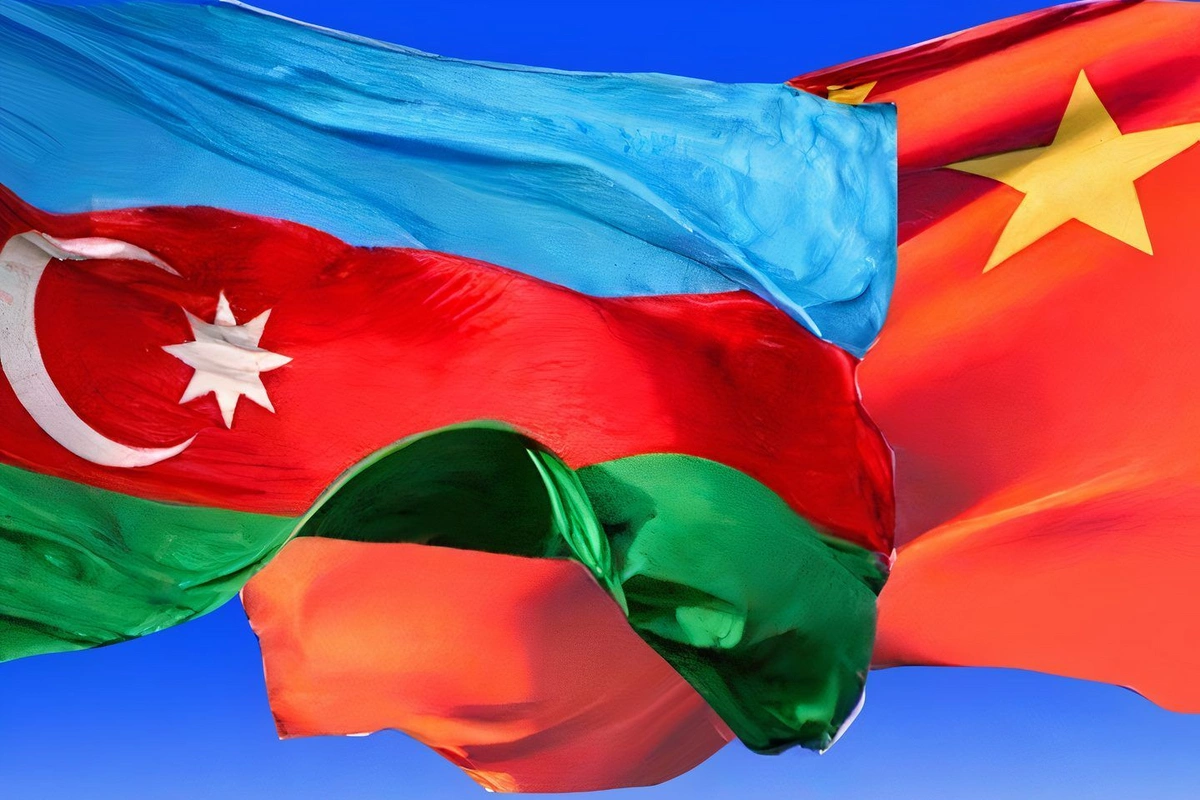
On April 23, a significant milestone was achieved in Azerbaijan-China relations: following President Ilham Aliyev's state visit to Beijing, both nations signed a Joint Statement establishing a Comprehensive Strategic Partnership. Presidents Ilham Aliyev and Xi Jinping formalized this agreement, marking a new phase of collaboration encompassing political, economic, and humanitarian dimensions.
Photo credit: president.az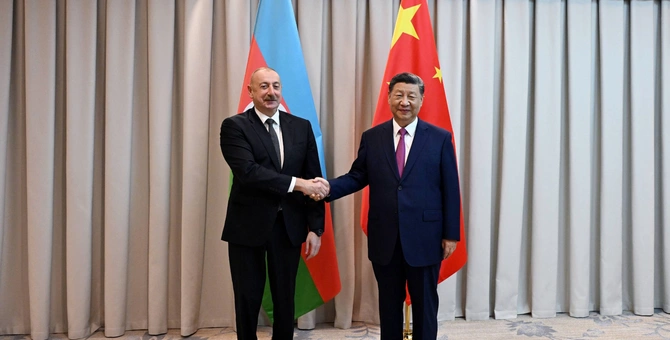
The journey toward this strategic partnership began in July 2024 with the signing of a relevant Declaration in Astana during the SCO summit. However, the April statement signifies not just a continuation but the commencement of a new stage characterized by trust, mutual support, and enhanced coordination across all levels.
The cordial and sincere atmosphere of the Beijing meeting highlighted the strong personal rapport between the two leaders. President Xi Jinping has consistently emphasized his friendship with President Aliyev, and this mutual understanding undoubtedly strengthens bilateral relations. When such personal ties reinforce state relations, they lay a solid foundation for long-term and sustainable partnerships.
The Joint Statement outlines key principles defining the political synergy between Baku and Beijing, including mutual respect for territorial integrity, adherence to international law, support for a multipolar world order, and joint efforts to combat contemporary challenges such as terrorism, extremism, and separatism. Azerbaijan expressed its readiness to join the Group of Friends of the Global Development Initiative proposed by China, while Beijing affirmed its support for the Baku Process and policies promoting intercultural dialogue.
Importantly, the rhetoric of both parties is backed by practical actions. China and Azerbaijan are not confined to declarations; they are progressively building a robust cooperation framework, showcasing a model of equal partnership based on sovereignty and respect for national interests.
Some observers are surprised by the global giant's keen interest in a relatively small South Caucasus nation. However, reducing China's interest to Azerbaijan's transit potential oversimplifies the picture. Post its victory in the Second Karabakh War, Azerbaijan has gained new political weight and confidently positions itself as a regional power, demonstrating political independence and consistency in its choice of partners.
Establishing a comprehensive strategic partnership is more than a diplomatic gesture; it signals that China views Azerbaijan as an autonomous player capable of not only integrating into global processes but also actively shaping them. For Azerbaijan, this opens new avenues for deepening trade and economic ties and participating in key Chinese initiatives like the "Belt and Road."
Baku and Beijing are embarking on a new chapter in their relations, where strategic partnership is not merely a declaration but a tool for joint progress.
The Middle Corridor: Foundation of Strategic Partnership Between Baku and Beijing
Transport and logistics cooperation remains central to the strategic agenda of Azerbaijan and China. The Joint Statement signed on April 23 in Beijing solidifies Baku's role in China's "Belt and Road" initiative, which Azerbaijan joined early on, well before regional geopolitical shifts.
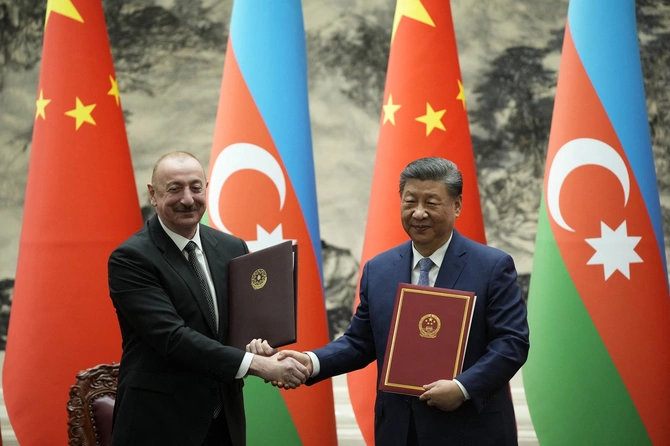
Chinese President Xi Jinping (R) and Azerbaijan's President Ilham Aliyev shake hands during a signing ceremony at the Great Hall of The People in Beijing on April 23, 2025. (AFP Photo)
Prior to his visit to China, President Ilham Aliyev emphasized in an interview with Xinhua that Azerbaijan has invested politically and infrastructurally in the "Belt and Road" project. He highlighted that Azerbaijan is the second-largest investor in this initiative after China, both domestically and internationally.
Azerbaijan has become a key link in the global transport chain connecting East and West. Infrastructure projects like Baku-Tbilisi-Kars, the North-South International Transport Corridor, and the Trans-Caspian route (Middle Corridor) have transformed the country into a strategic logistics hub in Eurasia. President Aliyev described the Middle Corridor as the most reliable, safe, and optimal route for cargo delivery between China and Europe.
Academia supports this view. Professor Hongsheng Sheng of Shanghai University noted at a recent ADA University forum that the Middle Corridor could foster a new economic model independent of Middle Eastern conflicts or the Ukraine-Russia war, ensuring uninterrupted transit crucial for global trade.
China recognizes this. The April 23 Joint Statement includes commitments to align China's "Belt and Road" initiative with Azerbaijan's "Silk Road Revival" state strategy and its socio-economic development strategy up to 2030. Emphasis is placed on resolving customs and logistics issues and establishing direct express routes along the Trans-Caspian direction-China-Europe-China.
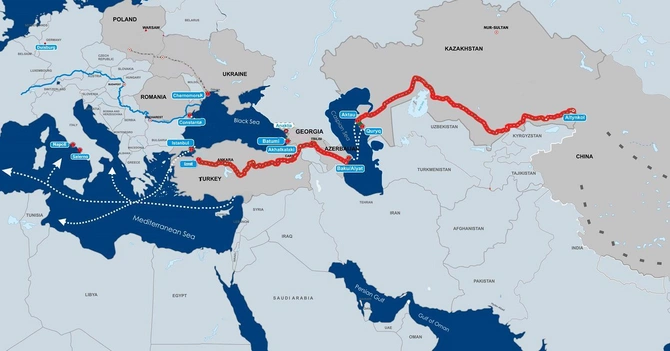
Photo credit: railfreight
Statistics affirm the effectiveness of this cooperation. In 2024, transit cargo volume between Azerbaijan and China reached 378,000 tons, an 86% increase compared to 2023. During the same period, 287 freight trains were dispatched from China to Azerbaijan for import and transit purposes.
These achievements contribute to global stability. Amid rising tensions elsewhere in Eurasia and attempts to destabilize key logistics routes, the Middle Corridor emerges as a dependable artery. Azerbaijan's political will, investments, and sovereign partnership capabilities make this route viable.
China views Azerbaijan not merely as a transit territory but as a strategic ally with political stability, flexibility, and pragmatism-a partner serving as a cornerstone for sustainable Eurasian development.
A New Economic Axis: Strengthening Trade and Investment Between Azerbaijan and China
Economic cooperation between Azerbaijan and China is entering a phase of deep institutionalization. A notable example is the signing of a Memorandum of Understanding on April 16 in Baku to establish a Working Group on Investment Cooperation. This occurred during the 10th session of the Azerbaijan-China Intergovernmental Commission on Trade and Economic Cooperation, aiming to coordinate efforts in trade development, investment partnership expansion, green energy, and digital economy.
Both parties expressed readiness to negotiate a free trade agreement, potentially transforming the structure of economic exchanges between the two nations.
While current trade volumes may not fully reflect the potential of bilateral cooperation, recent growth is impressive. In January-March 2025 alone, bilateral trade reached $1.3 billion, a 37.6% increase compared to the same period in 2024. China became Azerbaijan's fourth-largest trading partner and the largest supplier of imported goods, accounting for nearly 9% of the country's total trade turnover.
A significant development is the launch of a direct export railway route from Baku to China. In November last year, the first train carrying 62 containers of locally produced goods departed from Baku to Xi'an. This milestone represents a new phase in realizing the "Belt and Road" initiative.
At the intergovernmental commission meeting, China's Vice Minister of Commerce, Lin Ji, highlighted China's interest in importing various Azerbaijani products, including wines, pomegranates, poultry, hazelnuts, and almonds. Azerbaijan's trade houses in cities like Beijing, Xi'an, Chengdu, Shaanxi, Qingdao, and Nanjing play a crucial role in promoting these products in the Chinese market.
The Joint Statement signed on April 23 in Beijing emphasizes not only mutual trade growth but also industrial partnership, including joint digital transformation of industries. Priority sectors include petrochemicals, metallurgy, mechanical engineering, pharmaceuticals, and textiles.
This collaboration is evolving into a multi-level economic ecosystem where Azerbaijan and China act as co-investors, technological partners, and drivers of mutual modernization.
Azerbaijan and China: Mutually Beneficial Cooperation in the Era of Green Transformation
Photo credit: certrec.com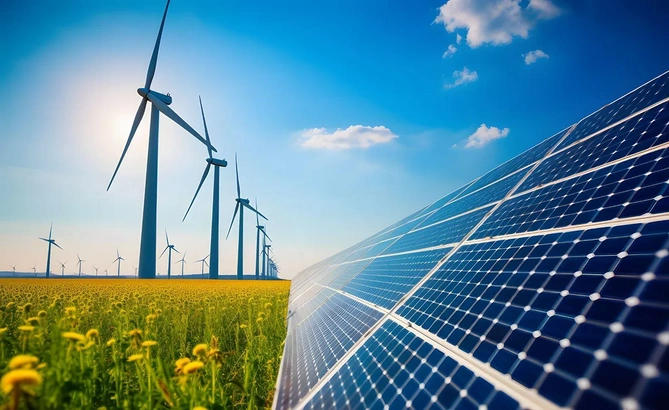
Renewable energy cooperation is becoming a cornerstone of the strategic partnership between Azerbaijan and China. Both countries have committed to supporting energy transition, promoting sustainable socio-economic development, and advancing international partnerships in clean energy, as outlined in the Joint Statement signed on April 23 in Beijing.
This commitment is backed by tangible actions. During the visit, several agreements and memorandums were signed to facilitate significant investments in green energy. These include an investment agreement for constructing a 100 MW solar power plant in Gobustan, agreements with Chinese companies for developing offshore wind energy and a floating solar power plant with energy storage on Lake Boyukshor, and a memorandum for a 2 GW wind farm in the Azerbaijani sector of the Caspian Sea.
These initiatives signify a shift from declarations to real projects, underscoring Azerbaijan's strategic focus on an environmentally friendly and sustainable development model.
China is not just an investor but also a technological partner for Azerbaijan. In an interview with CGTN in Davos, President Aliyev stated: "Our goal is to achieve 2 GW by 2027 and 6 GW by 2030 in solar and wind generation. This will be a true energy revolution in Azerbaijan's history. Chinese technologies-particularly solar panels and energy storage systems-play a key role here. No one can compete with Chinese manufacturers in quality and price."
This openness to technological cooperation is already yielding results. In preparation for COP29, agreements were signed between SOCAR Green and China Energy for constructing a 160 MW solar plant in the Fizuli district, along with memorandums for long-term cooperation in renewable energy. Planned initiatives include establishing a Research and Development Center
Share on social media